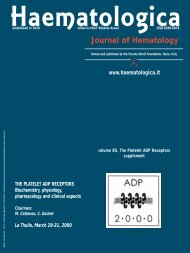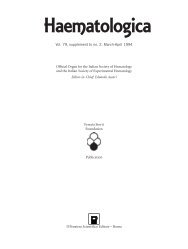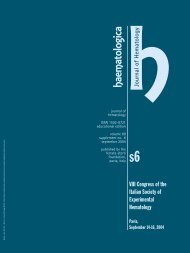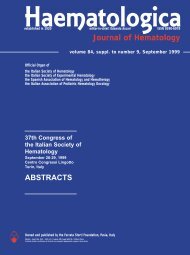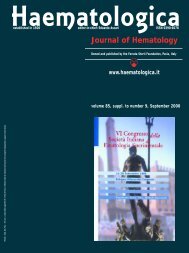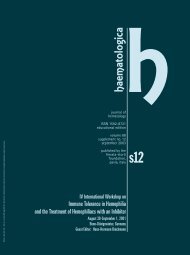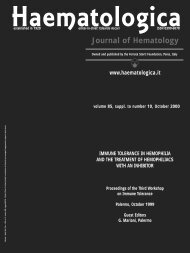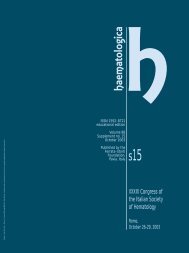Haematologica 2003 - Supplements
Haematologica 2003 - Supplements
Haematologica 2003 - Supplements
Create successful ePaper yourself
Turn your PDF publications into a flip-book with our unique Google optimized e-Paper software.
myeloma cells are able to induce OPN-secretion from host cells.<br />
The fact that myeloma-derived hepatocyte growth factor (HGF)<br />
induced OPN-secretion in a dose-dependent manner from the<br />
osteoblastic cell line Saos-2 supports this finding.<br />
073<br />
A novel recombinant bispecific single-chain antibody,<br />
Wue-1xCD3, induces T-cell mediated cytotoxicity<br />
towards human myeloma cells<br />
Dirk Hoenemann1*, Peter Kufer3*, Matthaeus M.<br />
Rimpler1*, Manik Chatterjee1, Freya Riechert1, Kurt<br />
Bommert1, 2, Axel Greiner4, Bernd Dorken1, 2, and Ralf C.<br />
Bargou1<br />
1Humboldt University of Berlin, University Medical Center Charité,<br />
Robert-Roessle-Klinik, Department of Internal Medicine,<br />
Lindenberger Weg 80, Berlin, Germany; 2Max-Delbrueck Center<br />
for Molecular Medicine, Robert-Roessle-Str. 10, Berlin, Germany;<br />
3Institute of Immunology, University of Munich, Munich, Germany;<br />
4Institute of Pathology, University of Wuerzburg, Wuerzburg,<br />
Germany<br />
The development of antibody-based strategies for the treatment of<br />
Multiple Myeloma (MM) has been hampered by the fact that<br />
suitable plasmacell-specific surface antigens have been missing<br />
so far. Although normal and malignant plasmacells express a<br />
number of well characterized surface markers they all have<br />
turned out to be not plasmacell-specific. However, recently a<br />
novel monoclonal antibody, designated Wue-1, has been<br />
generated, which specifically binds to the cell surface of normal<br />
and malignant human plasma cells. Therefore, Wue-1 is an<br />
interesting and promising candidate to develop novel<br />
immunotherapeutic strategies for the treatment of multiple<br />
myeloma. One variant for an antibody-based strategy is the<br />
bispecific antibody approach. In particular, recombinant<br />
bispecific single-chain antibodies are interesting candidates<br />
because they show exceptional biological properties<br />
discriminating these molecules from conventional antibodies. We<br />
have generated a novel MM directed recombinant bispecific<br />
single-chain antibody, Wue-1xCD3 (bscWue-1xCD3) and<br />
analyzed the biological properties of this antibody using the MM<br />
cell line NCI-H929 and primary cells from the bone marrow of<br />
patients with multiple myeloma and autologous or allogeneic<br />
effector T-cells. We were able to show that the bscWue-1xCD3<br />
induces efficient T-cell mediated cell death of NCI-H929 cells<br />
and primary myeloma cells in 10/11 cases analyzed. In contrast to<br />
conventional bispecific antibodies described so far, the<br />
bscWue-1xCD3, is efficacious at low E:T ratios and without T-<br />
cell pre-stimulation. Target cell lysis was specific for Wue-1<br />
antigen positive cells and could be blocked by the Wue-1<br />
monoclonal antibody. Wue-1 antigen negative NALM-6 cells<br />
were not lysed by bscWue-1xCD3 Ab. To our knowledge this is<br />
the first plasma cell-directed bispecific antibody described so far,<br />
showing promising results, and might therefore be a new<br />
potential agent for the treatment of malignant plasma cell<br />
disorders.<br />
074<br />
A recombinant HLA class I-specific single-chain Fv<br />
diabody induces cell death in human myeloma cells<br />
Shuji Ozaki1, Etsuko Sekimoto2, Yoichi Tanaka2, Takashi<br />
Ohshima2, Hironobu Shibata2, Toshihiro Hashimoto2,<br />
Masahiro Abe2, Tetsuya Goto3, Naoki Kimura4, Shin-ichiro<br />
Iida4, Masayuki Tsuchiya4, Toshio Matsumoto2, and<br />
Masaaki Kosaka5<br />
1 Division of Transfusion Medicine, Tokushima University Hospital;<br />
2 Department of Medicine and Bioregulatory Sciences, University<br />
of Tokushima Graduate School of Medicine; 3 Department of<br />
Internal Medicine, Tokushima Red Cross Hospital; 4 Chugai<br />
Pharmaceutical Co., Ltd.; 5 Department of Internal Medicine,<br />
Tokushima Prefecture Hospital of Kaifu, Japan.<br />
Cross-linking of HLA class I molecules has been shown to induce<br />
programmed death of human neoplastic lymphoid cells as well as<br />
activated lymphocytes. We have generated a novel anti-HLA<br />
class I monoclonal antibody (2D7) to examine the possible role of<br />
this molecule expressed on multiple myeloma (MM) cells.<br />
Moreover, a recombinant single-chain Fv diabody was<br />
constructed from the parent mouse IgG antibody. This diabody<br />
(2D7-DB) effectively causes cross-linking of HLA class I<br />
molecules and induces cell death of target cells. In this study, we<br />
compared the levels of HLA class I expression in MM cells and<br />
normal bone marrow cells, and evaluated the in vitro effects of<br />
2D7-DB to induce cytotoxicity and/or apoptosis in MM cells.<br />
Cell surface expression of HLA class I on bone marrow cells was<br />
analyzed by flow cytometry using fluorescein-labeled 2D7 and<br />
phycoerythrin-labeled anti-CD38 antibody for MM cell gating.<br />
Cells were cultured for 48 hours with 2D7-DB or 2D7 in the<br />
presence or absence of F(ab')2 goat anti-mouse IgG (GAM). Cell<br />
viability was determined by trypan blue staining. Induction of<br />
apoptosis was assessed by Annexin V/propidium iodide staining.<br />
HLA class I molecules were more strongly expressed in 13/15 of<br />
patient MM cells than in normal myeloid cells or lymphocytes.<br />
Cross-linking of HLA class I with 2D7 and GAM induced<br />
cytotoxicity of patient MM cells. More importantly, 2D7-DB<br />
alone mediated cytotoxicity in MM cells at 100 ng/mL, but not in<br />
normal myeloid cells or lymphocytes. MM cells treated with<br />
2D7-DB showed cytoplasmic vacuolization and positive staining<br />
for Annexin V. These findings indicate a functional role for HLA<br />
class I molecules in MM cell death and also provide new insights<br />
into the possible therapeutic strategies for targeting this molecule<br />
in MM.<br />
075<br />
Decitabine increases expression of cancer antigens<br />
MAGE-3 and NY-ESO-1 in multiple myeloma cell lines.<br />
Jan Van Droogenbroeck (1), Sushil Gupta (2), Friedel<br />
Nollet (3), Susann Szmania (2), Ramesh Batchu (2), Guilio<br />
Spagnoli (4), Arnold Criel (3), John Shaughnessy (2),<br />
Guido Tricot (2) and Frits van Rhee (2).<br />
(1) AZ Sint Jan, Department of Hematology, Brugge, Belgium.(2)<br />
Myeloma Institute for Research and Therapy, University of<br />
Arkansas for Medical Sciences, Little Rock, AR, USA.(3) AZ Sint<br />
Jan, Laboratory for Hematology, Brugge, Belgium.(4) University of<br />
Basel, Department of Surgery, Switzerland.<br />
NY-ESO-1 and MAGE-3 both belong to the group of Testis<br />
Cancer Antigens (TCA’s). TCA’s are present in testis and<br />
various malignancies, but not in normal tissues. NY-ESO-1 and<br />
MAGE-3 are highly immunogenic, eliciting B-cell and HLAclass<br />
I/class II restricted T-lymphocyte responses. About 20% of<br />
newly diagnosed multiple myeloma (MM) patients express these<br />
antigens, to reach more than double in relapse.<br />
S120



